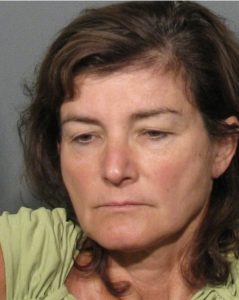Michelle MacDonald, who is a candidate for the Minnesota Supreme Court, is “unfit for office” according to former Associate Justice David Lillehaug, who defeated MacDonald when she ran against him for the Minnesota Supreme Court in 2014.

MacDonald is currently running for the Minnesota Supreme Court against Minnesota Supreme Court Justice Paul Thissen, who was appointed to the Minnesota Supreme Court in 2018. She was also an unsuccessful candidate for the Minnesota Supreme Court in 2016 and 2018.
In a letter to the editor published today by the Star Tribune, Lillehaug wrote:
Based on my two years on the court with Justice Thissen, I can attest that he is thoughtful and ethical, works hard and reads our laws as written. By contrast, based on her record, [Michelle MacDonald] is plainly unfit for the office.
Lillehaug retired from the Minnesota Supreme Court on July 31, 2020.
MacDonald is currently facing discipline from the Minnesota Supreme Court that could impact her ability to serve on the court if she was elected next week.
Earlier this month, a judicial referee appointed by the Minnesota Supreme Court determined MacDonald “caused harm to both the public and legal profession” that warrant MacDonald being placed on supervised probation.
Senior Judge E. Anne McKinsey was appointed in June by Minnesota Supreme Court Chief Justice Lorie Gildea as the referee to hear the petition for disciplinary action against MacDonald. McKinsey’s recommendation that MacDonald is placed on supervised probation was made in a court filing yesterday after a disciplinary hearing which was held last month.
MacDonald has been previously disciplined by lawyers board for multiple rule violations
MacDonald has been disciplined twice for multiple rule violations since she was admitted to practice law in Minnesota in 1987.
In 2012, MacDonald was disciplined by the Lawyers Professional Responsibility Board for “for failing to deposit settlement proceeds into a trust account, failing to maintain proper trust account books and records, failing to promptly deliver funds to a client, failing in her duty to be responsible for the conduct of a non-lawyer and failing to cooperate with the Director’s investigation…”
A judicial referee appointed by the Minnesota Supreme Court found in 2018 that MacDonald violated “at least seven Rules of Professional Conduct over the course of two different client matters.”
The Minnesota Supreme Court later suspended MacDonald’s law license for 60 days and placed her on supervised probation for two years after determining she “made false statements about the integrity of a judge with reckless disregard for the truth; improperly used subpoenas; knowingly disobeyed a court rule and failed to follow a scheduling order; and engaged in disruptive courtroom conduct, including behavior resulting in her arrest.”
Court affirms ruling that MacDonald “knowingly violated” campaign law
In September 2017, the Minnesota Court of Appeals affirmed a ruling from the Office of Administrative Hearings that MacDonald “knowingly violated” campaign law when she falsely claimed she was endorsed by a non-existent Republican organization during her 2016 campaign.
In December 2016, the Office of Administrative Hearings (OAH) ruled against MacDonald and also imposed a $500 civil penalty for violating the Minnesota Fair Campaign Practices Act.
The initial complaint against MacDonald was filed by Barbara Linert of Eagan and Steve Timmer of Edina.
MacDonald wrapped herself “like a mummy” in her jail cell
A federal civil rights lawsuit filed by MacDonald in March 2015 against Dakota County stemming from her arrest while representing Sandra Grazzini-Rucki in a family court hearing was dismissed in September 2017.
It was during the custody hearing involving Grazzini-Rucki and her ex-husband, David Rucki, on September 12, 2013, that MacDonald took pictures in the courtroom which led to her being arrested.

MacDonald spent a portion of the trial representing Grazzini-Rucki while confined to a wheelchair after her refusal to walk back into the courtroom. MacDonald also refused to put on her shoes and glasses, or provide her legal name and address to law enforcement.
In March 2016, the court dismissed many of MacDonald’s claims including, false arrest, false imprisonment, malicious prosecution, and retaliatory prosecution leaving only a few claims left to argue.
At that time, the court also found no grounds for claims of excessive force and state assault and battery “which related to her removal from the courtroom, removal of her personal effects, and placement in a wheelchair.”
Also dismissed were claims of equal protection, federal conspiracy, negligent and intentional infliction of emotional distress, and finally a claim by Thomas Shimota, MacDonald’s husband, for loss of consortium.
The federal lawsuit filed by MacDonald revealed details of her time in custody which MacDonald had not previously disclosed.
Because MacDonald raised claims regarding the conditions of confinement during her time in jail, the court was left to examine whether or not “Jail staff expressed intent to punish her” or if the removal of her mattress, toilet paper, and bedding were “reasonably related to legitimate governmental objective.”
In the examination and subsequent order, the court stated that, according to an affidavit submitted in support of Dakota County’s motion, a deputy testified that “Jail staff removed her cell mattress because she ‘crawled underneath it’ and removed her toilet paper because she ‘used it to wrap herself from head-to-toe, like a mummy.'”
The opinion continues, stating “[t]he Court notes that MacDonald’s behavior hindered the Jail from observing her well-being, which was especially important because MacDonald did not answer medical screening questions.” Based on this “legitimate purpose” for the removal of her mattress and toilet paper, the court determined there was no violation.
MacDonald’s legal work examined in an award-winning true crime book
An examination of MacDonald’s legal work was detailed in the book, The Girls Are Gone which was released on October 23, 2018.
 The book also includes new information about the disappearance of Samantha and Gianna Rucki and the adults who conspired to keep the missing sisters and the truth hidden.
The book also includes new information about the disappearance of Samantha and Gianna Rucki and the adults who conspired to keep the missing sisters and the truth hidden.
The Girls Are Gone also explores the connection between MacDonald and two people convicted for their roles in the disappearance of the Rucki sisters: Sandra Grazzini-Rucki and Dede Evavold. MacDonald was labeled a “person of interest” by the Lakeville Police Department in the disappearance of Samantha and Gianna Rucki but did not cooperate in the investigation.
Since being released in October 2018, The Girls Are Gone has been a commercial and critical success. In April, Brodkorb and Allison Mann were awarded a 2019 Independent Publisher Book Award. The Kindle Edition of The Girls Are Gone has appeared on multiple “best seller” lists by Amazon. The Girls Are Gone is published by Wise Ink Creative Publishing.
Last October, Brodkorb and Mann released an audiobook of The Girls Are Gone, which was produced at Studio Americana. The Girls Are Gone is available for sale through numerous retailers in audiobook, paperback, and ebook.
Please follow Missing in Minnesota on Twitter and Facebook for updates on the 2020 campaign for the Minnesota Supreme Court.





